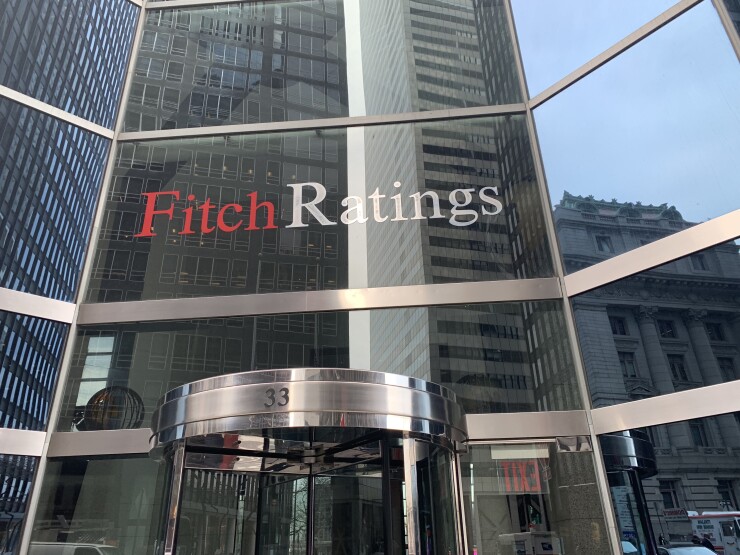Fitch Ratings changed the outlook on two Southern California cities, Long Beach and Los Angeles, to negative this week.
The negative outlooks on Long Beach and Los Angeles, both revised from stable, indicate the direction the rating is likely to move over a one-to-two year period; but don’t imply that a rating change is inevitable, Fitch analysts wrote.
“The negative outlooks for both Long Beach and Los Angeles tie to the possibility of a more constrained financial resilience in the future,” said Alan Gibson, a Fitch director.

Fitch affirmed Los Angeles’ long-term rating at AA, on its $229 million in outstanding general obligation bonds and $59 million in solid waste resource revenue bonds. The city’s $776 million in outstanding Municipal Improvement Corporation of Los Angeles lease revenue bonds were affirmed at AA-minus.
The city’s GOs are payable from ad valorem property taxes, while the MICLA debt is paid using the city’s lease rental payments for use and occupancy of various facilities and capital equipment. Solid waste resources revenue bonds are paid from a first lien on pledged solid waste resources fee revenues, including penalties and interest, net of administrative charges made by the Los Angeles Department of Water and Power.
Long Beach’s long-term rating was affirmed at AA by Fitch. It also affirmed at AA-minus the ratings on lease revenue bonds it rates issued by the Finance Authority of Long Beach and the Long Beach Bond Finance Authority.
Long Beach holds a Aa2 rating and stable outlook from Moody's Investors Service.
“The revision of Long Beach’s outlook to negative was explicitly tied to Fitch’s concern that continued revenue losses with a prolonged recovery could lead to extended budget pressures and a weakening of the city’s superior financial resilience,” Gibson said. “Fitch expects Long Beach to make necessary budget adjustments to avoid significant erosion in reserves, but the severity and longevity of revenue losses could make aligning recurring expenses with recurring revenues difficult.”
“Sustained pressure in Long Beach’s financial flexibility exhibited by reduced reserve levels and an inability to replenish its unrestricted fund balances after the coronavirus-related economic crisis could lead to negative rating action,” he said.
Similarly, Gibson said, the revision of Los Angeles’ outlook to negative was explicitly tied to the extensive budget balancing actions necessitated by the current economic downturn, which have the potential to reduce Los Angeles’ financial resilience during the subsequent economic recovery period.
Los Angeles’ city administrative officer early this month
“Simultaneously rebuilding reserves and services during the economic recovery period will likely be challenging, especially in the event that recovery is slow,” Gibson said. “Reduced financial resilience as a result of fiscal responses to the pandemic, leaving Los Angeles vulnerable to weaker operating performance during future periods of economic and revenue volatility, could lead to negative rating action.”
Los Angeles' general obligation bonds are rated Aa2 by Moody’s, AA by S&P Global Ratings, and AA-plus from Kroll Bond Rating Agency.
All of the rating agencies cited the city’s ability to successfully manage its finances after the 2008 economic crash as a strength in rating reports in August when the city priced a $266.9 million lease revenue bond refunding. The city came out of that with a half a billion structural deficit that took years to right.
Gibson, one of the analysts who penned the ratings reports, said he isn’t aware of any other California cities that have had their outlooks revised to negative recently.
The rating agency affirmed San Francisco’s rating at AA-plus on Sept. 9.
This comes after Fitch gave a stable outlook generally to U.S. states and local governments in a Dec. 7 report.
In the sector outlook, Fitch analysts cautioned however, that as the nation continues its recovery from the deep coronavirus-driven trough, states and local governments will continue to face challenges in managing weakened tax revenues with pressure to maintain or increase public services spending.
“Fitch believes state and local government revenues will continue to be vulnerable to declines in 2021, with the full impact of the enormous dislocation due to the coronavirus pandemic still to be realized,” Amy Laskey, managing director of public finance and infrastructure said in the report.
While the number of state and local ratings that are on negative rating outlook is elevated, the vast majority of rating outlooks are stable, but very few ratings are on positive rating outlook, Fitch analysts wrote in the sector outlook.
Fitch anticipates potential modest erosion in credit quality if the economic impact of the pandemic continues to stifle revenues, but does not anticipate a significant downward shift in ratings.
Fitch said Tuesday the $900 billion in the federal





